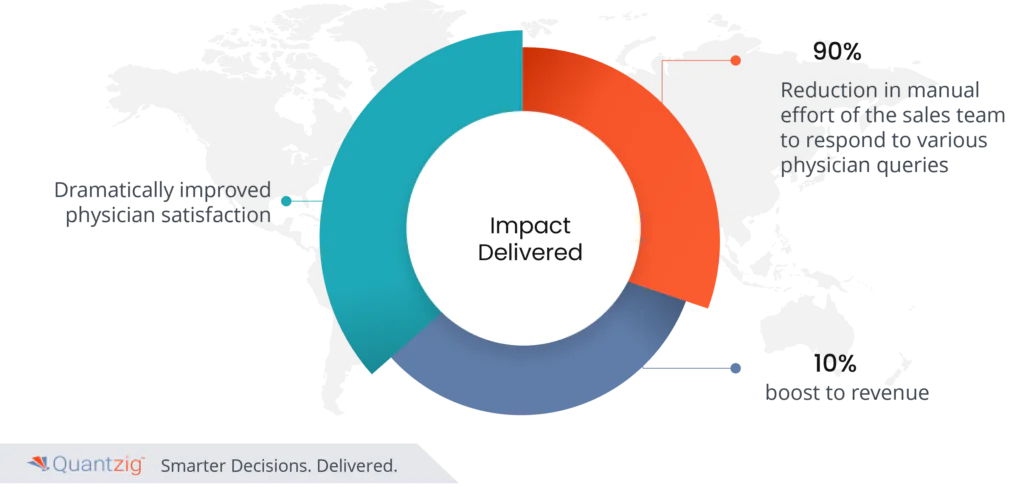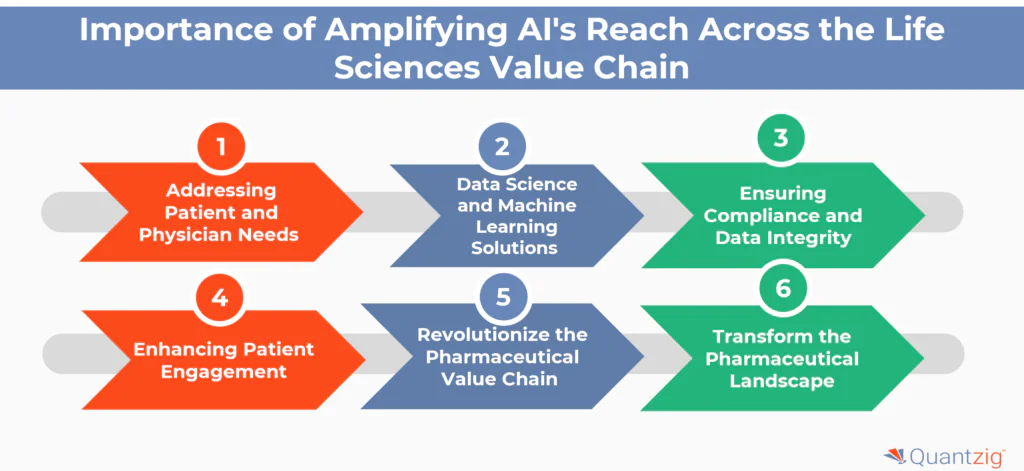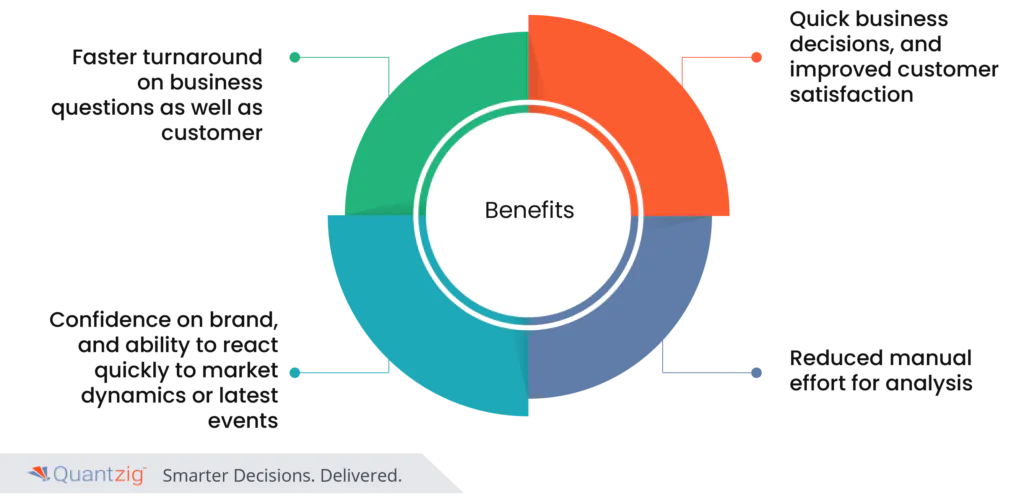Author: Associate Vice President, Analytics and Data Strategy, Quantzig.
Table of Contents
Introduction to AI in Life Sciences Value Chain
In the life sciences sector, the integration of artificial intelligence (AI) is revolutionizing the End-to-End Life Sciences Supply Chain, transforming pharmaceutical manufacturing optimization and enabling biotech innovations in drug discovery. AI enhances patient-centered innovation by improving care and engagement while allowing healthcare professionals to efficiently navigate regulatory compliance. Utilizing advanced medical imaging techniques, AI streamlines clinical trials and data management, accelerating life sciences digital transformation. This game-changing technology propels the industry toward precision medicine and healthcare integration, fostering supply chain resilience in pharma and enabling collaborative research. Ultimately, AI is a catalyst for a more intelligent and impactful future in advanced genomics and biotechnology, driving significant advancements across the entire value chain.
This case study will shed light on how Quantzig’s game-changing centralized platform helped a leading US-based pharmaceutical company experience a 90% reduction in the manual effort of the sales team to respond to various physician queries and a 10% boost in revenue.
Book a demo to experience the meaningful insights we derive from data through our artificial intelligence tools and platform capabilities.
Request a Free DemoQuantzig’s Expertise in AI in Life Sciences Value Chain for a Leading US-based Pharmaceutical Company
| Category | Details |
|---|---|
| Client Details | A leading pharmaceutical company located in the US. |
| Challenges Faced by The Client | Manual handling of the drug related inquiries, and slower response times to client queries. |
| Solutions Offered by Quantzig | Quantzig developed an AI-powered centralized platform that enhances physician engagement by providing near real-time responses to 90% of inquiries and seamlessly routing complex questions to sales representatives, thereby improving efficiency and fostering stronger professional relationships. |
| Impact Delivered | Dramatically improved physician satisfaction, 90% reduction in manual effort of the sales team to respond to various physician queries, and 10% boost to revenue. |
Client Details:
A leading pharmaceutical company located in the US.
Challenges faced by the Client:
- The launch of a new drug is a critical juncture for pharmaceutical companies, and rapid market adoption is often impeded by information gaps. In this scenario, the client’s sales team found themselves inundated with inquiries from physicians seeking details on the drug’s benefits, efficacy, insurance coverage, and real-world evidence (RWE) supporting its use. The manual handling of these inquiries not only consumed valuable sales team resources but also hindered the timely dissemination of crucial information to physicians.
- As a result, the slower response times impacted the confidence-building process, delaying the market’s acceptance of the new drug. To mitigate this challenge, implementing an efficient AI-driven solution for information retrieval and response management can significantly accelerate the confidence-building process and revenue growth.
Solutions offered by Quantzig:
- Quantzig spearheaded the development of a game-changing centralized platform, leveraging AI algorithms, to enhance the customer experience for physicians visiting the company’s website. This innovative solution allowed physicians to pose inquiries about the brand and promptly receive answers in near real-time, effectively addressing a staggering 90% of their questions.
- For the remaining 10%, which demanded a more personalized touch, the system seamlessly routed these queries to the respective sales representatives or business executives. This approach not only streamlined and expedited the information exchange process but also empowered the sales team to focus on higher-priority, more complex inquiries.
- The result was a more efficient and responsive engagement model, fostering stronger relationships with physicians and, ultimately, accelerating market acceptance and revenue growth.
Impact Delivered:

- Dramatically improved physician satisfaction;
- 90% reduction in manual effort of the sales team to respond to various physician queries;
- 10% boost to revenue
Get started with your complimentary trial today and delve into our platform without any obligations. Explore our wide range of customized, ai solutions built across the analytical maturity levels.
Start your Free TrialImportance of Amplifying AI’s Reach Across the Life Sciences Value Chain:

1. Addressing Patient and Physician Needs
In the rapidly evolving healthcare landscape, characterized by the convergence of diverse forces, including the surge in patient expectations for real-time access to cutting-edge information, the need for immediate and accurate insights is paramount for both patients and physicians alike. Meanwhile, pharmaceutical markets are navigating through heightened volatility, demanding agile responses from industry players. At the epicenter of these dynamics, the life sciences sector grapples with managing vast volumes of big data brimming with untapped potential.
2. Embracing Data Science and Machine Learning Solutions
To confront these challenges head-on, pharmaceutical companies are increasingly embracing data science and machine learning-based solutions. These technological trends in life sciences realm offer accelerated response times, benefiting not only internal stakeholders but also external customers such as physicians and patients. The prowess of machine learning lies in its capacity to facilitate rapid and precise diagnoses, tailor personalized treatment plans, and streamline the drug discovery continuum. From the intricate process of drug discovery to the optimization of the life science supply chain, AI serves as a transformative force, augmenting efficiency and, crucially, enhancing patient outcomes.
3. Ensuring Compliance and Data Integrity
Moreover, in the realm of clinical trials and clinical development, the integration of pharmacovigilance and regulatory intelligence ensures compliance with stringent guidelines set forth by regulatory agencies. These efforts are complemented by robust data management practices, safeguarding the integrity and confidentiality of patient data throughout the drug discovery process and beyond.
4. Enhancing Patient Engagement and Medical Imaging
Furthermore, the emphasis on customer and patient engagement fosters a holistic approach to patient care, wherein healthcare providers leverage innovative medical communication strategies to enhance the patient experience. Within the clinical setting, advancements in medical imaging techniques enable precise diagnoses and monitoring of clinical-trial populations, leveraging both genetic data and phenotypic data to inform personalized treatment plans.
5. Revolutionizing the Pharmaceutical Value Chain
In essence, the integration of machine learning, big data, data science, and other cutting-edge AI-driven technologies across the pharmaceutical value chain revolutionizes life sciences and pharma operations, medical affairs, R&D (Research and Development), operations, Clinical-trial processes leading to a more efficient, responsive, and patient-centric healthcare ecosystem.
6. Transforming the Pharmaceutical Landscape with AI
As AI continues to advance, it holds the promise of transforming the pharmaceutical landscape, facilitating data-driven decision-making, and ushering in a new era of personalized healthcare that is faster, more accurate, and more patient-centric.
Challenges faced while implementing AI Across the Life Sciences Value Chain
The pharmaceutical industry faces significant challenges in harnessing its big data resources. These hurdles include the sheer volume of data collected at various stages, limitations in data analysis capabilities, and GDPR constraining data capture. Moreover, the utilization of AI models not contextualized for pharma-specific terminologies and protocols often results in misleading and incomprehensible outputs for business stakeholders. Overcoming these obstacles necessitates tailored AI solutions, robust data analytics capabilities, and stringent adherence to data privacy regulations, ultimately enabling the industry to derive meaningful insights from its data and make informed, contextually relevant decisions.
Digital disruption is revolutionizing industries such as travel, hospitality and logistics, as well as sectors like medical devices and biotechnology segments. In the realm of pharmacovigilance, intelligent automation enhances safety monitoring and reporting. Improved customer engagement strategies are crucial across these industries, particularly in supply chain logistics, where AI optimizes drug and medicine development and aids in forecasting demand. However, challenges persist while implementing AI across the life sciences value chain, including issues of data integration, regulatory compliance, and ensuring the accuracy and reliability of AI models.
Benefits of implementing AI Across the Life Sciences Value Chain:

The integration of AI solutions within the pharmaceutical industry promises a myriad of benefits.
- These encompass faster responses to critical business inquiries and customer queries, including those from physicians and patients.
- Swift decision-making, empowered by AI-driven insights, ensures that pharmaceutical companies can adapt promptly to market dynamics and respond effectively to the latest events, such as emerging healthcare trends or regulatory changes. Moreover, this not only enhances customer satisfaction but also builds confidence in the brand.
- Furthermore, the reduction in manual effort for data analysis is a significant advantage. AI’s ability to process and analyze vast datasets at remarkable speeds enables pharmaceuticals to redirect their focus toward higher-value tasks, such as strategy development and innovation.
- In a rapidly evolving sector, the adoption of AI not only streamlines life sciences and pharma operations but also places pharmaceutical companies at the forefront of healthcare advancements, ultimately benefiting patients, physicians, and the industry as a whole.
Experience the advantages firsthand by testing a customized complimentary pilot designed to address your specific artificial intelligence requirements. Pilot studies are non-committal in nature.
Request a Free PilotLife Sciences Industry-Specific Processes
Industry-specific processes include the following specific value chain functions:
- Research and development: pre-clinical investigations, clinical trials, market and competitor intelligence, and other procedures pertaining to the development and formulation of new drugs.
- Regulatory: Services that facilitate adherence to different regulatory obligations, both pre-submission and post-submission.
- Pharmacovigilance: Procedures that aid in the identification, evaluation, comprehension, and avoidance of side effects or any other drug-related issue following a license for use.
- Supply chain: Services that facilitate the movement and control of inventory from production to use.
- Sales and marketing: Services that enable marketing and sales operations and related analytics.
These functions represent the range of unique processes undertaken by life sciences and pharmaceutical firms to conduct their core business.
The application of AI in life sciences
Life sciences, one of the most strictly regulated industry sectors where product safety and health outcomes are particularly closely related, has historically—and understandably—approached the adoption of new AI-driven technologies with a great deal of caution. Despite this, the industry has now embraced innovation because there are so many applications for AI. Businesses are starting to automate current procedures using AI throughout the life sciences value chain, such as the following:

- The identification and diagnosis of illnesses, including cancer and problems with the nervous system. An AI system created by researchers at the Alan Turing Institute and Cambridge University can identify dementia with just a brain scan.
- To find cancer treatment medications that might be used to target a particular gene mutation in children with incurable brain cancer, UK scientists employed an AI-powered drug discovery platform.
- By analyzing available post-market surveillance data for already-marketed drugs, the FDA is using AI tools to create models that can predict adverse events for new drugs.
- Pharma companies can conduct clinical trials, for instance, by quickly gathering, combining, and analyzing clinical trial data using AI-driven technologies.
- You can design robust and more responsive supply chains, including forecasting demand and supply enabling manufacturers to accurately manage production levels, and increasing visibility and traceability.
The industry has been at the forefront of creating mechanisms to address any potential negative effects that may arise from its use, such as cybersecurity protections, because of its adoption of AI. This is indicative of a broader pattern whereby the life sciences industry is frequently the first to adopt new AI technologies and to regulate them, with other industries.
Conclusion
As we conclude this exploration of AI’s transformative role in the life sciences value chain, it’s evident that we stand on the brink of a new era. AI’s integration has the potential to reshape the industry, making healthcare more efficient, personalized, and responsive to the needs of patients and physicians. With the ability to process vast data, accelerate diagnoses, and enhance drug development, AI empowers the life sciences sector to tackle its most complex challenges. Unparalleled opportunities mark this journey into the future, and as AI continues to amplify its reach across the life sciences value chain, we are poised for a healthcare landscape that is not only smarter but profoundly more patient-centric and innovative.



